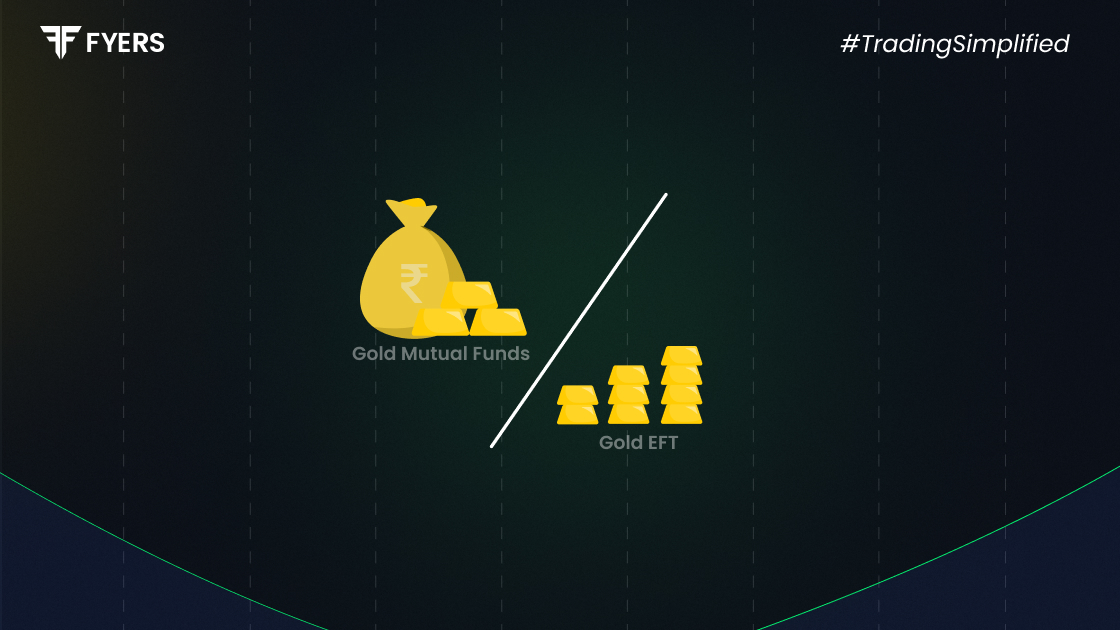

 29 Mar, 2025
29 Mar, 2025
 4 mins read
4 mins read

Gold has long been a preferred investment asset, offering a hedge against inflation and economic instability. As the preferences have changed towards holding financial assets, investors now have the option of choosing between Gold Mutual Funds and Gold ETFs to gain exposure to gold without physically holding it. But which is the better option? This article explores the difference between Gold ETFs and Gold Mutual Funds, their advantages and disadvantages, and how to decide the right choice for your investment goals.
Gold Mutual Funds are open-ended funds that invest primarily in Gold ETFs or other gold-related assets. These funds do not require a Demat account, making them accessible to a broader range of investors. They can be bought and sold through fund houses and allow investments via Systematic Investment Plans (SIPs), enabling investors to contribute small amounts at regular intervals.
Gold Exchange-Traded Funds (ETFs) are financial instruments that track the price of gold and are traded on stock exchanges like equity shares. These ETFs invest in gold bullion or gold futures contracts. They provide real-time liquidity, allowing investors to buy and sell units during market hours. Each unit of a Gold ETF typically represents one gram of gold, making them a convenient way to invest in gold without holding it physically. Unlike Gold Mutual Funds, Gold ETFs require a Demat and trading account.
|
Feature |
Gold Mutual Funds |
Gold ETFs |
|---|---|---|
|
Investment Mode |
Invests in Gold ETFs or gold-related assets |
Directly tracks gold prices |
|
Demat Account Needed |
No |
Yes |
|
Liquidity |
Redeemed at NAV value at the end of the day |
Traded in real-time on exchanges |
|
Investment Method |
SIPs and lump sum |
Lump sum only |
|
Expense Ratio |
0.6% - 1.2% |
0.5% - 1% |
|
Entry/Exit Loads |
May have exit loads |
No entry/exit loads |
|
Trading Time |
Based on NAV (end of day) |
Market hours (real-time) |
No Demat Account Required: Investors can buy and sell units through mutual fund houses without needing a trading account.
SIP Facility Available: Allows investors to start with small amounts and invest systematically over time.
Professionally Managed: Managed by fund managers who allocate assets strategically to optimize returns.
Ideal for Long-Term Investors: Less volatility compared to Gold ETFs since mutual funds are not subject to market fluctuations during trading hours.
Real-Time Liquidity: Investors can trade Gold ETFs like stocks, allowing quick entry and exit.
Lower Expense Ratios: Advantages of Gold ETFs include lower management costs compared to mutual funds.
No Exit Loads: Unlike some Gold Mutual Funds, Gold ETFs do not charge penalties for early redemption as they can be sold on the stock exchange at anytime during the market hours..
Better Transparency: Gold ETFs track live gold prices, ensuring real-time valuation of investments.
Higher Expense Ratios: Managing a mutual fund incurs higher costs compared to ETFs.
Delayed Liquidity: Redemption happens at end-of-day NAV, not instantly like ETFs.
Possible Exit Loads: Some funds may charge exit fees if withdrawn before a specified period.
Demat Account Requirement: Investors must have a Demat and trading account, increasing the overall cost.
No SIP Option: Gold ETFs require lump sum investments, which may not be suitable for small or regular investors.
Brokerage Fees: Buying and selling on stock exchanges may incur brokerage and transaction fees.
The choice between Gold ETFs and Gold Mutual Funds depends on your investment goals:
Choose Gold Mutual Funds if:
You prefer systematic investments via SIPs.
You don’t have a Demat account and want a simpler investment process.
You seek professional fund management.
Choose Gold ETFs if:
You want real-time trading flexibility.
You prefer lower expense ratios and transparent pricing.
You already have a Demat account and are comfortable with stock trading.
So, which is better - gold ETFs or gold mutual fund? Ultimately, both investment options provide exposure to gold investment options in India, but the best choice depends on your financial strategy, liquidity needs, and risk tolerance.
Gold ETFs are better for investors looking for real-time trading, lower expense ratios, and direct exposure to gold prices. However, Gold Mutual Funds are more suitable for those who prefer SIP investments and do not have a Demat account.
Gold ETFs and Gold Mutual Funds are both subject to capital gains tax on gains made. However, Gold ETFs are taxed as equity assets, with long-term capital gains taxed at 12.5% without indexation when held for more than a year. Gold Mutual Funds follow the same tax treatment, but if they invest in a fund-of-funds, they may be subject to debt fund taxation rules.
Most Gold ETFs in India are designed such that one unit of Gold ETF equals one gram of gold. However, this can vary slightly depending on the ETF provider and fund structure.
The choice between Gold ETFs and Gold Mutual Funds depends on your investment needs. Gold ETFs are better for those who want lower costs, real-time trading, and better transparency, while Gold Mutual Funds suit investors who prefer SIPs, professional management, and do not have a Demat account.
Calculate your Net P&L after deducting all the charges like Tax, Brokerage, etc.
Find your required margin.
Calculate the average price you paid for a stock and determine your total cost.
Estimate your investment growth. Calculate potential returns on one-time investments.
Forecast your investment returns. Understand potential growth with regular contributions.